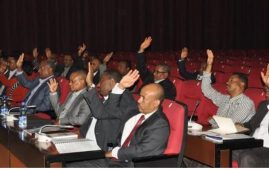In an interview this week with the Ethiopian Radio and Television Agency, Prime Minister Hailemariam answered questions on the recent restructures in the executive, on the overall performance of the Growth and Transformation Plan, on government plans to look to the public to tackle the problems of good governance, and on the efforts to lower inflation. The Prime Minister underlined the institutional strength of the ruling Ethiopian People’s Revolutionary Democratic Front and of the developmental government which provided for the country’s stability. He said that all those who had been “trumpeting doomsday stories forecasting instability in Ethiopia after death of Prime Minister Meles Zenawi” were people who were totally ignorant of the institutional strength of the government and administration and of the industriousness of the Ethiopian people.
The Prime Minister noted that the recent changes in the organization of the executive involved the creation of two administrative clusters, covering Good Governance and Reform, and the Economy and Finance. Ministers have been appointed to coordinate these clusters. Ato Muktar Kedir has been appointed Minister of the Civil Service, and
coordinator of the Good Governance and Reform Cluster, with the rank of Deputy Prime Minister. Dr. Debretsion Gebremichel, the Minister of Communication and Information Technology, has been appointed to coordinate the Economy and Finance Cluster, also with the rank of Deputy Prime Minister. The Prime Minister made it clear these changes were designed to improve the operation of the Growth and
Transformation Plan. He said that the strategies and directions to enable implementation of the plan were all now in place and carrying these out was the major task for the immediate future.
The Prime Minister noted that the major GTP projects, the Mega projects, were operating according to the schedules laid out in the Plan. The hydro power projects, for example, including the Gilgel Gibe III Dam and the Grand Ethiopia Renaissance Dam (GERD) were well on course to meet the 10,000 MW target for the end of the GTP in 2015. By the middle of the year, it seemed that more than 13% of GERD and over 60% of Gilgel Gibe III had been completed. In road sector, a series of major projects were under way at a cost of some 20 billion birr, and they were also on schedule. The Prime Minister pointed out that the government was covering some 90 per cent of the cost of these road developments from its own resources. He added that implementation of a number of railway and telecom projects have now started, backed by reliable funding from both local and foreign sources. He reflected that the World Bank had provided loans larger than ever before and that the EU, USA and other development partners, were also increasing their support.
The Prime Minister also spoke of the government’s efforts to create a public movement against the problem of maladministration. He said that the government had now completed its identification of activities related to areas where the problems of maladministration were rampant. These included, he said, land administration, tax collection, business license registration, telecom and power services and justice administration. All of these had major problems of poor governance and administration. Now, preparations had been completed to initiate a nationwide public response to tackle the need for good governance in a meaningful way.
Prime Minister Hailemariam noted that inflation remained a challenge for Ethiopia’s burgeoning economy as it had over the past few years. Explaining measures taken to bring the inflation rate he said “Government activities aimed at controlling the circulation of the money and the provision of basic commodities in bulk to the public have enabled us to lower the inflation rate to 15.8%”. He further said the government was working to bring down the rate down to single figures as soon as possible. Measures involved the promotion of savings, dealing with problems of housing particularly in Addis Ababa, creating jobs through small and micro enterprises, and rectifying problems in the wholesale trade and in distribution.
The Prime Minister noted that the government was working to ensure that the upcoming local and Addis Ababa elections would be conducted in a peaceful, fair and democratic way. He took the opportunity to call on all parties to work towards peaceful conduct of the elections.
***********
* Originally published on A Week in the Horn – Dec. 7, 2012 issue, titled “The Prime Minister responds to questions”. Items from A Week in the Horn are re-published here with a permission to do so. You may republish it with attribution and no modification to its contents.
Check the archive for related posts.





